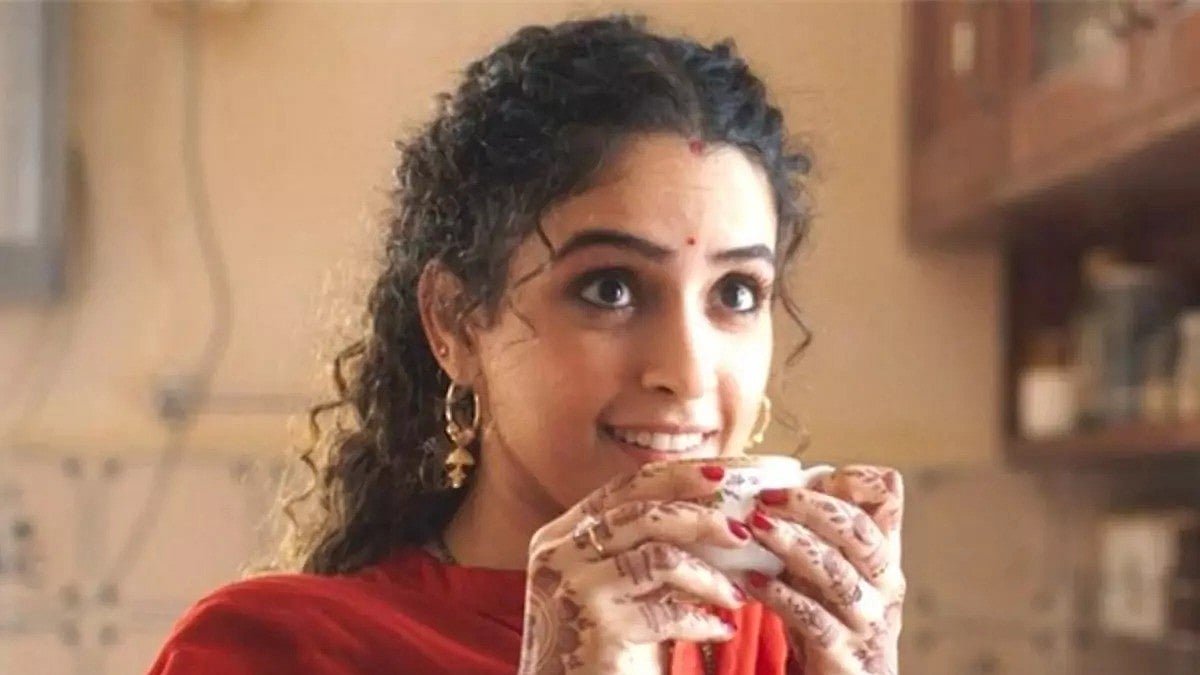Title: Mrs
Director: Arati Kadav
Cast: Sanya Malhotra, Nishant Dahiya, Kanwaljit Singh, Meena Kumar, Gulista, Mrinal Kulkarni
Where: ZEE5
Rating: 3.5 Stars
If the way to a man’s heart is through his stomach, then Mrs ensures that journey is paved with quiet despair, sweat-soaked exhaustion, and the relentless clatter of kitchenware. A sharp critique of domestic drudgery, this remake of The Great Indian Kitchen (2021) slowly simmers patriarchy in its own oppression. Directed by Arati Kadav, the film is a potent reminder that misogyny, much like a well-kneaded dough, is often smooth, elastic, and internalized to perfection.
Sanya Malhotra plays Richa, a trained dancer and a dance teacher, who finds herself trapped in the mechanical rhythms of a traditional household after her marriage to Diwakar Kumar (Nishant Dahiya), a wealthy doctor. What follows is not a dramatic, headline-worthy oppression but a quieter, more insidious routine of systemic servitude. The morning light spills over freshly chopped vegetables, steam rises from boiling lentils, and the silent weight of expectation presses down heavier than a rolling pin. Cutting, kneading, frying, sweeping, dusting—on repeat, with no end credits in sight.
The genius of this film lies in its mundanity. This is not a film that rushes to a climactic confrontation. Instead, it takes its time, much like the unrelenting, thankless labour of a homemaker. The camera lingers, making sure the viewer experiences the tedium that defines Richa’s new life. A leaking pipe under the kitchen sink becomes a slow, dribbling metaphor for her decaying autonomy. A reference to prime numbers subtly reinforces her singularity, a reminder that she was once whole, not just a fraction of someone else’s story.
Kadav’s direction ensures that the audience is never spoon-fed its discomfort; instead, it is served on the table, with each meal symbolizing the unending cycle of female subjugation. By the end of each day, Richa is too drained to even enjoy the food she toils over, while her husband and father-in-law remain blissfully unaware of their privilege, cocooned in the illusion that their needs are being met by some divine, self-sustaining system. Her father-in-law’s biggest struggle? Waiting for his slippers to be aligned correctly.
Sanya Malhotra, an actress who has consistently chosen roles that demand nuance, carries the film with remarkable restraint. Richa’s journey from quiet compliance to muted defiance is played with the kind of precision that doesn’t demand your attention—it commands it. Nishant Dahiya and Kanwaljit Singh, as the husband and father-in-law, bring an almost eerie normalcy to their characters, reinforcing the unsettling reality that their brand of entitled helplessness isn’t unique—it’s generational.
Pratham Mehta’s cinematography ensures that the kitchen, usually framed as a warm, nourishing space in most Indian films, transforms into something cold and claustrophobic. Prerna Saigal’s editing is razor-sharp, ensuring that the monotony never becomes monotonous. The pulsating dance sequences offer a brief, fleeting escape before reality sets in again.
Ultimately, the film offers no easy answers. It simply holds up a mirror, inviting the audience to take a long, uncomfortable look at the everyday injustices woven into domestic life. Will it make a difference? Perhaps. At the very least, it ensures that many will squirm, suddenly aware of the unseen hands that serve them their next meal.
